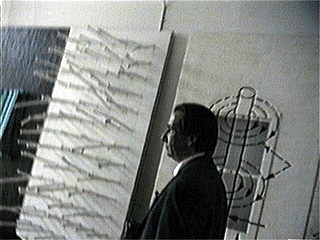 N. So, uh, want to talk about some of your work?
N. So, uh, want to talk about some of your work?
No! (laughs)
No. You don't want to do that?
You know, I work with kids. The thing about working with these kids again has gotten me extremely positive. And when you talked about those old days? No, I don't want to return to those old days. We were negative. Or at least we were heading into...We were heading into a direction that was fairly, you know...You remember the days when we were doing art that was mimicking art or was not trying to be art or ...We thought we had all the answers.
N. I was thinking back about how pure that energy was for me. Maybe that's why so many young people seem so... I've seen so many young people that don't have new strategies, they're doing the same stuff. But they must just have that pure enthusiasm that I remember I used to have, which I just don't have anymore. You know, I've used up that energy.
I teach kids in high school right now that are painting paintings that are – I show them the same techniques that I've shown college students for the last twelve years – and they are coming up with as good paintings as the college. And people come in and look at these kids' work. They are going, "This is high school?" And I say, "Yeah." And what is the difference here? All I have to do is give them the materials, give them some brief history of how this thing came through the pike to here, where we are today, and tell them to do what they think is real. And it's amazing. This experience has changed my thinking. At first I used to think when I first met the kids when I started to go back to the school, I was scared of them, petrified. I hadn't been around teenagers. I was thirty-five years old. I thought they were going to eat me up. And then I found out that they were really nice people.
And then something else happened. I was dressing like them and acting like them. And then I thought. "Wait a minute. Something's wrong with this picture. They're fifteen and I'm thirty-five. One of us has to make a bit of a transition. And so I think I decided to become an adult. I decided to become the older figure for these kids. Now, they knew I had no experience (laughs) and so I bumbled my way through it and as long as I was honest, they responded to me. And it all worked out. And we still get along great. I left the school for a couple of years and then went back when they started getting a lot of foreign students.
N. You were able to arrive with an adult mien.
Well I had been working already, but when I went back I was really prepared because I had been working in some colleges and working with a lot of foreign students. And I like this exchange that's happening on the Pacific Rim. It's happening everywhere.
N. I think one thing is that people on the Pacific Rim, Japan for sure and probably Korea, have very fairly strict educational standards. And they're coming from a position of expecting a teacher to make demands on them and to interchange with them on a fairly sophisticated level.
They come over and their systems are very rigid. It's not even about those countries. These kids don't represent those countries.
N. Yeah, they're probably the oddballs in those countries.
Exactly. They're the artists. They're the uncalibrated types. So sure, send them to art, send them to America. And it's crazy because they don't represent those countries. They don't represent the philosophies of those countries. They do and they don't. They're children. And what happens is that we get together and we talk about art. And art is this plastic subject and it becomes really fascinating. But because of all this it gets you sort of going on this thing that everything's going to be okay. There are these kids that are going to keep coming through and they are very interested in making a mark. And they are very interested in changing things. They want to have an influence. And they're stylish and they are exciting. And they're going to do things differently. And you can't help but get into this kind of thought pattern that, "Hey wait a minute, we're not getting older. This is not over." It's just starting. It's better. It's like a wake up call. It's like ...
N. So you think that you could go from say, when you first went downtown and there's all that stuff happening, but you think it's cynical...
Yeah, in the beginning. And I was fairly cynical. Up until about '82.
N. Is that when you first went up to Idyllwild.
I call it Isomata. But it's actually Idyllwild Arts. I didn't start going there until '86. They didn't start the school until '86. But by '86 I was fairly hopeful again because I went through the quick dealers ... and got settled in with Doug Christmas at Ace.
N. Which was, in eighty?
Eighty-six. His attitude was so professional that he just scared the hell out of me.
N. Did you feel that there was a lot of demands on you?
I felt like I had to redo everything.
N. Really? Was that when you had that kind of abandoned imagery and went into more abstract form?
I did do a couple of image based pieces when I was with him, but not many. In the beginning I was intimidated, being in the company of the people that he was showing. I still believed in ... I've always believed in art. Yeah. I've always believed in it. What happened in the late 70s and early 80s was a cynical time, when I was young. And then about the mid 80s, not only my involvement with Ace, but the involvement with the school began to reestablish more of the love affair that I have with the subject. It's been growing ever since then. I still feel you're still capable of doing something, that painting is still okay, that if someone says it's bad, Well if you work with anybody, kids or students or anybody, you always have to look at the opposite of the equation, too. If it's half empty, well what's the half full answer. So naturally ... from '86 on it's been a half full situation. And I feel good about being an artist. I feel good about being downtown, in fact. I'm not here all the time but ... it's a half full experience when I am here.
N. Yeah, I can see that. I mean I'm going to be moving and I'm a little bit worried about losing track of this energy a little bit. There is always a certain kind of energy downtown.
I mean the energy that makes downtown good, I mean interesting, is that you're surrounded by people that are trying to make art.
N. Or trying to make a living.
I can't live in an industrial area if there are no artists around. It's not just the industrial area, it's the fact that there are artists in this area experiencing this stuff and feeding off the creative thing.
N. Do you spend very much time talking to other artists?
Actually, I do. I run into artists all the time down here. I was working at the bar to get this studio into shape in the beginning. I'm no longer doing it but people would come in ... It was hard for me because I hadn't talked to a lot of artists in a long time and now I was talking to people again. It was good for me. It was a good experience. I needed to do it.
N. I tend to think of you as fairly reclusive, but maybe that's not really exactly the case.
No, I'm really busy. Monday I'm out at Claremont Graduate School. So I'm talking to all these artists there, in the morning. I'd say that the average age of the student out there is about thirty. They are a little bit older. And then from there I go up to Idyllwild. And I'm intermixing with these very interesting educators. I mean to teach at this academy these people had to give up other things. There are young teachers and older teachers, a very interesting group of people. So you can exchange ideas with those people and then the kids ... These kids come from all over, Arizona, New York, California and then there is a group of them from Japan, Korea. By Wednesday I've been half way around the world. And then I come back here.
N. So basically you have Thursday, Friday, Saturday and Sunday to work on your stuff?
Uh-huh. It's never enough time. And I've been doing this for the last three years. So I am quite busy. Last year I went to Seoul. They took me to Seoul as part of the school, we went to an education conference. This year I will go to Japan for a week. Went to Texas. Went to New York a couple of times.
N. Do you ever feel envious, that you wished you could be shown in those places?
No, I think that the success that has come to people, they deserved. This is a really complex business. If you can come up with something that can cut across everything that it has to cut across to become successful you've done a good job. For all of the people that I know that are in the business, in any business, that's a very rare thing. I don't take away from them ... There is enough to do as well in a lot of other areas that can keep people quite busy and make them feel quite successful.
N. Do you think feeling successful is important to artists?
There has to be... I have to feel...when I'm talking to my students that they are respecting me as an artist and so the associations that I have are important because that is how they perceive me. Personally, we could all do nothing. But that's ...
N. But you have chosen this. So you're talking a little about the career of being an artist has invested in success because success leads to contacts and leads to new information that then feeds back into making your work change and evolves through this whole thing. So it is a very professional endeavor.
There is a lot of responsibility with the profession. And I just ... I'm trying to keep up. And I actually respect that I can be a part of it. And that is a different involvement than when I was younger. I don't think I had this kind of awareness. I'm kind of proud that I'm doing this for a living. When I was younger I took it for granted.
N. I can see what you are saying. I know you came from a working class family. Do you think that ever put pressure on you, that that is part of why it's important to you to be successful?
No my family was very open in regards to that. They never questioned my being involved in the arts. I don't know. I respected it when I was little.
N. You had grown up with this feeling that art was an important endeavor.
I had good teachers. I had really good teachers. I didn't understand how good they were until after. I had a very good high school teacher. I found out later that the school I went to was actually an experimental school, my high school in Whittier. I found out years later that the school I had gone to was separated out of the district. It was part of the baby boom. There were all these high schools in this area and they chose to make this one school kind of an experiment. They put all the youngest teachers in it. And so by chance I went to this school. I came from a modest background and couldn't have paid for that if I wanted to. But people did that kind of thing when they lived in those kinds of ... we forget about the ideal aspects of the 50s and 60s. There were some wonderful things that were experimented with. And I happened to get a great education. I had some really good teachers. My college teachers were all involved in the art world, were showing artists, at undergrad school. And I went to New York afterwards and met older artists who talked about the growing of the profession and the philosophy of the working artist being able to live comfortably in their lifetime with this profession. And so there was always a lot of idealism in my education about what art could be, a respectful relationship in the community, a respectful relationship with the work itself. And I think as a young man getting out of college, coming off of the 70s, there was a lot of cynicism as to what that was going to be in the future. But for those of us that stayed with it, I think we lost the cynicism. I don't see it in negative terms. But I think there definitely needs to be some discussion as to how people are being prepared.
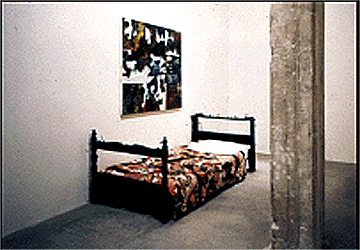 N. You're talking about the change from "I'm going to get my success, my financial support" to say "No, I'm going to try and figure out what role to play in the whole society, so it's not just about me".
N. You're talking about the change from "I'm going to get my success, my financial support" to say "No, I'm going to try and figure out what role to play in the whole society, so it's not just about me".
When you work with college kids you just sort of relate to them on a professional level. But when you work with younger students you get a lot of information going through your box on what's going on in education. The kids are under a hell of a lot more stress. There's less drug use. There's less erratic behavior than when I first started working. They're very much aware of the cost of education for them, the choices that they're going to make, the strains on their families. This is a different generation of college students than when I went to school. When I went to school the system was free. Now, the system costs. The pressure on these kids is very serious, has very serious consequences. Poverty on these kids is going to be very serious. Poverty related stress as a result of being a student going into their twenties is going to be a very serious issue, I believe, personally, because of being an artist and having gone through that.
... I talk very positively about directions we're moving in, but we have to communicate. We have to figure out some of these problems. I think there's definitely going to be a lot of stress-related anxieties amongst young twenty-somethings in the next 10 to 15 years. We're already seeing it with the freshman class now. And we're seeing people who are doing these studies are saying we should be concerned about this. Well, if you take that logically for the next couple of years, there are a lot of things that are not going to be easy that we need to start gearing up for.
N. How can we gear up for them?
Well, I'd like to see education come down in cost. If athletes can be on scholarships, why can't artists be on scholarship? The subjects that worry me that don't have those calibrated kinds of results to them, the philosophy department, sociology department, the art department, the English department. You can't translate an $80,000 education into a ... if we're going to selfishly ignore that, then I think that we're being very ignorant. It would be a shame to lose a well-rounded education, to burden certain parts of it with stress, or a success/fail [mentality], and I think that education has to seriously deal with these issues and I don't see them jumping to it.
N. Yeah, I have to say that my experience being on the board of a non-profit artists organization – I'm not on the board now but I was – I started to feel like the organization wasn't really understanding that it needed to not be just about success and failure, that we're not just out there trying to find the next artist that's going to be shown at MOCA. That really isn't what it's about. And I felt frustrated because I didn't think that as an organization they really understood that. I think that there's a lot of potential in these organizations, but they're sluggish. I was always thinking that this organization and that organization should know this group of people, this school, those people on the street, plus this person. This all needs to be put together. I guess the logistics of financing that is always a big problem. But the reality of it existed, that all these things could be put together.
If only you could bridge all those egos. The pressure to succeed on a financial basis... I think artists are going to become important emissaries. We're going to have to help people understand that education is important.
 N. Well I've been suffering from the sense that contribution is only measured in these limited terms. And trying to find a way as an artist that is committed to doing the work, that there is a benefit to somebody. It doesn't have to be a monetary benefit but it has to feel, like you said, that I'm not at the end of the line, that there's somebody following behind who can appreciate, if not the actual thing I did, at least the intent of what I'm doing.
N. Well I've been suffering from the sense that contribution is only measured in these limited terms. And trying to find a way as an artist that is committed to doing the work, that there is a benefit to somebody. It doesn't have to be a monetary benefit but it has to feel, like you said, that I'm not at the end of the line, that there's somebody following behind who can appreciate, if not the actual thing I did, at least the intent of what I'm doing.
Look at us. We met twenty years ago. You were in that apartment building in Hollywood. You came from San Francisco. I had the loft downtown. Twenty years later, what are we doing? We're still talking about the support aspect, not the glitz aspect, but the educational aspect, the quality aspects of the arts. We're still involved. I was explaining to a student who called last night and wanted to come by, said that no I had to do this thing and she was saying "Well, why? Why? Who are these people?" "Oh, they are Mitchell and Nancy. Don't you know Mitchell and Nancy?" "No, I don't." "Oh that's right, you guys only hear about the successes. You only hear about the tops, the tops of these peaks. You never hear about what's at the 6,000 foot level." (laughs).
M. On the one hand I'm listening to David and going "Yeah, idealism!" Then I'm thinking, "Yeah, but he's talking about high school. What would you find in college. Frankly my teaching experience in college was ...
N. Not so idealistic....a very dog-eat-dog attitude.
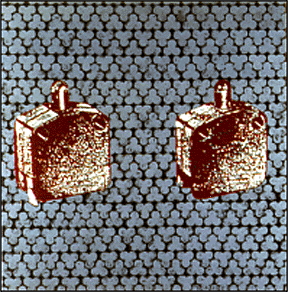 Yeah, and college is that way... It's all that way, even in high school. Bill, my friend who runs the school, has to shield me from the other teachers sometimes because ... for the first two years I didn't call the roll. I wouldn't bother calling in who was absent or who was present in my class. (laughs) But I said this earlier, I'm not totally Pollyanna. I understand and realize, your comments are right on. Sometimes I walk out from the college level and get the feeling that we're not talking about the purity of trying to be original anymore, we're talking about making it. And we're actually even teaching about making it, now. There's a pressure to do that. But again I think it's because of the wrongheadedness of charging so much for the education to begin with. If we could get rid of that aspect of it and get it back to a theoretically based kind of, intellectually based, idealistically based situation, that would help. Also I think that you're going to have to get writers that are going to have to get away from that creating an atmosphere that people can hide in, success-, press-wise.An older friend of mine, an older artist, said it to me in the 80s, part of the problem of the 80s was, when it was dealing with the financial aspect, was that the writing was so sloppy in regards to that. And it's true. You could get just about anybody, if you paid them, to write about people. And I think that the buyers realized that as well, the collectors realized that as well. People have been taking advantage of this growth. There's no question. Now, they can continue to take advantage of it and play a very conservative role. To me that would be a conservative thing to do – take advantage of it and let it drift into, let it fall into its own protective little confine of who succeeds and who doesn't succeed. That would be the conservative thing to do. And I see it doing that. For as much as the art world pretends to be liberal about things, I see themselves acting very conservative. They are not going to be expansive again unless they start to take an aggressive role and begin to refuse to write those kinds of articles, begin to refuse to show those kinds of shows, begin to refuse to put up with that kind of plagiarism. But you see this opens up territory for the artist. If the artists want to be serious about what they are doing again, all they have to do is start defending this stuff themselves.
Yeah, and college is that way... It's all that way, even in high school. Bill, my friend who runs the school, has to shield me from the other teachers sometimes because ... for the first two years I didn't call the roll. I wouldn't bother calling in who was absent or who was present in my class. (laughs) But I said this earlier, I'm not totally Pollyanna. I understand and realize, your comments are right on. Sometimes I walk out from the college level and get the feeling that we're not talking about the purity of trying to be original anymore, we're talking about making it. And we're actually even teaching about making it, now. There's a pressure to do that. But again I think it's because of the wrongheadedness of charging so much for the education to begin with. If we could get rid of that aspect of it and get it back to a theoretically based kind of, intellectually based, idealistically based situation, that would help. Also I think that you're going to have to get writers that are going to have to get away from that creating an atmosphere that people can hide in, success-, press-wise.An older friend of mine, an older artist, said it to me in the 80s, part of the problem of the 80s was, when it was dealing with the financial aspect, was that the writing was so sloppy in regards to that. And it's true. You could get just about anybody, if you paid them, to write about people. And I think that the buyers realized that as well, the collectors realized that as well. People have been taking advantage of this growth. There's no question. Now, they can continue to take advantage of it and play a very conservative role. To me that would be a conservative thing to do – take advantage of it and let it drift into, let it fall into its own protective little confine of who succeeds and who doesn't succeed. That would be the conservative thing to do. And I see it doing that. For as much as the art world pretends to be liberal about things, I see themselves acting very conservative. They are not going to be expansive again unless they start to take an aggressive role and begin to refuse to write those kinds of articles, begin to refuse to show those kinds of shows, begin to refuse to put up with that kind of plagiarism. But you see this opens up territory for the artist. If the artists want to be serious about what they are doing again, all they have to do is start defending this stuff themselves.
N. I was going through this really crabby thing thinking "the artists don't control the art world anymore", and then I realized that's not true. Artists really are in control. It's just a few artists. And who they choose to be the next person who is shown here or there. They have tremendous power. And they are really calling the shots to a lot of these museum curators and writers, and everything ...
For their work?
N. No, for the work of people that they are giving the nod to.
Yeah, that's fine, but the three of us could do a show somewhere and the word of mouth aspect could be just as significant...or even more significant, and that's how we started. That's how we met.
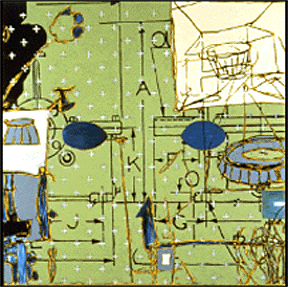 We met after I had worked with Robin Winters and Colleen and Jenny Holtzer, Louise Lawler and Richard Prince. And why can't it start again? And what makes you think it won't? These kids, as long as I go and tell them about those stories, hopefully they'll take the initiative and do it. I hear stories all the time of what Southern California wants to perceive itself as an art community and I chuckle a little bit. I mean, what's being talked about as being the strength of Southern California right now, through this sort of chamber of commerce mentality, is not exactly what I would call the strongest part of southern California.
We met after I had worked with Robin Winters and Colleen and Jenny Holtzer, Louise Lawler and Richard Prince. And why can't it start again? And what makes you think it won't? These kids, as long as I go and tell them about those stories, hopefully they'll take the initiative and do it. I hear stories all the time of what Southern California wants to perceive itself as an art community and I chuckle a little bit. I mean, what's being talked about as being the strength of Southern California right now, through this sort of chamber of commerce mentality, is not exactly what I would call the strongest part of southern California.
N. You think it is kind of a manufactured thing?
Well, I don't know what's going on. All I know is that I'm doing this with you right now and that seems to make sense, because I understand where you're coming from.
N. It is nice to hear you say that your experiences have made you optimistic. That it's not just that you're trying to be optimistic in the face of negativity, but that there are real things that make you optimistic.
We could do the same things we did when we were younger, only better. And what you're doing right now is part of it. What this is part of right now. What I'm trying to do right now with these kids, I do talk about them more than I do about the adults, because they interest me more because they are more positive. They're not talking about trying to get into a certain gallery, they're just interested in making art. So naturally I do tend to talk about them more. The optimism is because I know that my professional friends that are still working are doing things that I respect.
N. Do you think there will be some future time when people will look back at this time and it will take a different shape than the way it seems to be shaping now. I mean the people that are prominent or are influential now. Not that they won't be given their due but that there would be other people that would surface in retrospect of having been influential that weren't given as much attention?
Going back to what we said about what an artist was, back in the beginning. You tell an artist to look at something and they're not necessarily looking at what you're telling them to look at but they're sort of drifting around. Well I think it's the same answer. History is like an artist when it goes back to look at what a period of time really represented, or the influence of it, it may not look at what that period of time has dressed all up for it.
I saw once a catalogue that the military puts out about things that they're interested in purchasing, or ideas that they'd like to see people experimenting with ... but the stuff they were looking for was certain kinds of paint that would reflect any surface ... of really sophisticated things. But these ideas were all done in a very broad spectrum. And you know it looked like, it was like ... artists. They were looking for artists. And that convinced me. Listen, if you think that this isn't a volatile field, that this doesn't have an influence on society, that we're all like crackpots trying to solve all kinds of Pollyanna ideas? Wrong! Because these same kinds of questions are being raised in other areas. And it's up to us to keep them within the spectrum of things that we believe in, that make sense to us, that are idealistic if you will. Otherwise, we're all going to be working for...That kind of cynicism. I'd rather be wasting my time trying to figure out how not to repeat patterns. Even if it is impossible.
M. that same kind of ability to marshal resources goes on in advertising, entertainment, public relations...
But we're going to claim to stay one step ahead of them! (laughs) No matter how big, no matter how flashy, no matter how dynamic! We're still going to be missing the point and kind of looking around ... (laughs)
N. So basically our self-description as artists is "We're the ones that are missing the point."
It's just asking questions. Artists ask questions. Scientists ask questions. Philosophers talk about questions, unresolved ... There's a lot of people, a lot of communication. There's a lot for us to do. We could push a little bit harder. I feel that I can push a little bit harder. I'm attempting to push a little harder. I want an environment that's pushing me. I want my own thoughts to be pushing me. It's not about money. This is a great place, a beautiful view. It's the middle of downtown L.A. It's a dicey situation to some people, but it's not to me. I don't live here seven days a week. But ...
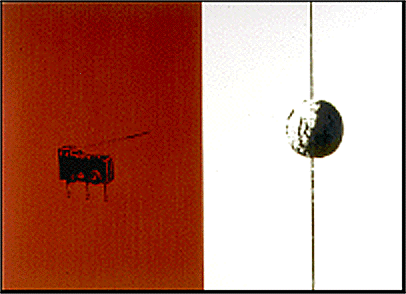 N. There is that thing about being exhausted. I know that I felt incredibly guilty living downtown and not helping any of the people around here. I didn't know what to do. I always felt that, yes, I really should be doing more, a lot more.
N. There is that thing about being exhausted. I know that I felt incredibly guilty living downtown and not helping any of the people around here. I didn't know what to do. I always felt that, yes, I really should be doing more, a lot more.
Some people do. You are in a way. I give platelets. It's a blood product. I didn't do it for the homeless. I did it for a friend of mine. And then I kept doing it afterwards. But you find different ways. You volunteered work for L.A.C.E. for those years.
N. But I started to feel L.A.C.E. wasn't really addressing those issues.
But they are. The arts are addressing issues. The arts are an advocate for these people down here. And have been. They know it. They don't mess with us. They respect us because we respect them. We've brought interest to the area. We've fed off each other in a sense. In some respects, they've kept our rents low. We understand their problems. We understand the problems of addiction, a lot of us. There's a lot of symbiotic relationships with them. People want to better themselves. We want to see the situation bettered.
N. Have you seen people that you've seen through the years on the streets actually be able to better themselves?
A couple of people have moved away, yes. Sure. There are sad things. I can remember defending downtown when I was a little boy. I grew up just outside of here. I remember someone saying we should just pack up all these people and ship them off to somewhere. And I remember saying, no they have a right to be there and be free. And if they're depressed, they have a right to be depressed. And I don't know what I was saying, but I was in tears defending this. And I was twelve or thirteen years old, and I was having this really emotional ... I don't know why I was defending that position, but I was. Whatever it takes, whatever, the power of guilt, the individual, whatever's involved, I'm not sure ... I'm not sure that anybody's sure. It was important to have psychological help for these people. You can't let them not have that. Some kind of net. They need that support. But to demand that they subscribe to a certain way of society, or not go through what they're going through, I don't know. I couldn't do that. I couldn't round them all up and put them in a camp somewhere. That would not be my... I couldn't do that. I've had times in my life where I had to figure things out... This is an area that is real gray.
N. It is gray. It is very gray. Definitely. I must have felt that it was not so dangerous. But there are dangerous elements. But there are just these people that are crushed. And most people have been around people who have been crushed in some way. And I don't have a lot of optimism of them being able to make them whole again, but I feel sorry for their being crushed.
